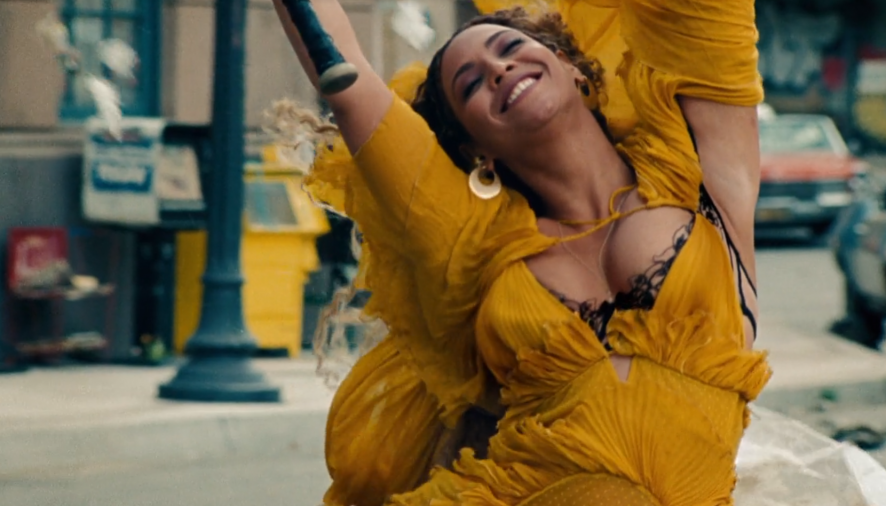Jodie Yates takes a look at Beyoncé’s powerful new visual album Lemonade.
It is a truth universally acknowledged that Beyoncé is a goddess. Lemonade’s narrative of sexual, racial and feminine liberation is a political and artistic statement that the goddess is every black woman.
Effortlessly sliding back onto her throne, the Queen is back with her second visual album, Lemonade, a multi-sensory celebration of Black Woman Magic. Rich, gorgeous and bold: Lemonade is an hour-long, visually narrative exploration of betrayal, womanhood and race. Layered with imagery and weaved together by the poetry of Somali-British poet Warsan Shire, Beyoncé is reinventing the album form in and taking us on a journey through Black America. Female empowerment and the Black Lives Matter movement are set against visuals of the Southern Gothic, from old plantations to the flooded streets of New Orleans, a constant reminder of the mistreatment of black people throughout history.
Criticised throughout her career for selling out to white audiences, Beyoncé makes it clear that this is for black women everywhere in ‘Freedom’, a collaboration with Kendrick Lamar, whose 2015 song ‘Alright’ became an anthem of the Black Lives Matter movement. In this she preaches “I break chains all by myself, won’t let my freedom rot in hell” to an audience of black women. This surreal and supernatural epic evokes the spirit of ‘#blackgirlmagic’, bringing together the achievements of black women from different generations. Beyoncé nods to writers such as Zora Neale Hurston and Toni Morrison in its style, whilst putting empowered black women such as Zendaya, Serena Williams and Amandla Stenberg on the screen. Her intention: centralising the black female experience.
With some critics declaring this an ‘autobiographical album’ due to allegations of Jay-Z being unfaithful to Beyoncé years before, many assume this is a charged reaction to personal anguish. To read Lemonade as personal is missing the bigger picture. Her lyrics talk of personal infidelity and betrayal, which some have called out as being shallow, and weakening her critique of the treatment of black people. However this is a dense and layered celebration of black culture and the presence of Malcom X’s speech on the black woman shows that this is no self-obsessed narrative. Betrayal is the topic at the core of Beyoncé’s lyrics, a potential allusion to the betrayal of infidelity, but more poignantly the betrayal of an entire group in society; the black woman. Malcolm X’s ‘disrespected’, ‘unprotected’ and ‘neglected’ black woman is the axis on which Lemonade spins. We see her in Beyoncé’s scorned character. We see her in the mothers of Tamir Rice, Michael Brown and Trayvon Martin – young, black men killed by American police – clutching photos of their sons.
Similarly, continuing the legacy of female blues singers, the betrayal of men has often been a metonym for the patriarchal betrayal of the black woman. Additionally Lemonade’s allusions to black female heritage are not sparse. Dressed as Nefertiti, evoking Nigerian Yoruba tradition, Africana feminism and spirituality, Beyoncé places all these things in the heart of the Dirty South. Lemonade is born where traditional and modern blackness collide, reimagining modern black womanhood in the American psyche.
The album’s second song, ‘Hold Up’, a tongue-in-cheek pastiche of the ‘angry black woman’ is an example of Beyoncé’s finessed ability to reclaim black stereotypes and make them glorious. She skips through the streets, grinning as she smashes car windows. On first glance this is a bout of mania overcoming a woman scorned, yet it seems to be a reminder to her critics, the “albino alligators”, that Beyoncé and black women in general are not to be walked over. Lemonade culminates in ‘Formation’, which gathers all the imagery of the album in one raw anthem on the importance of womanhood and black culture. Compared to a Toni Morrison novel chopped up, Beyoncé summarises the hour with a critique of American systematic failings of black people, a celebration of black beauty, the “negro nose with Jackson 5 nostrils”, and a perfectly Beyoncéian indictment of radical self-love. The album’s title is inspired by a speech by Jay-Z’s grandmother we see towards the end of the hour. She states “I had my ups and downs but I always find the inner strength to pull myself up. I was served lemons but I made lemonade”. These words, like Lemonade, resonate in the political as much as they do the personal. There is pain as much as there is joy in Lemonade which ultimately underlines that black women survive in a society that stifles them.
Lemonade is a poignant, touching and unlike anything she has previously done, hitting new artistic and political heights. Ever empowering, Beyoncé delivers an unapologetic catwalk of black female excellence, rather than an outpour for relationship troubles, using her acclaim to shine light on the marginalised. And if Piers Morgan said he ‘preferred the old Beyoncé’ we know that the Lemonade-era Beyoncé is only a step in the right direction.
Jodie Yates

